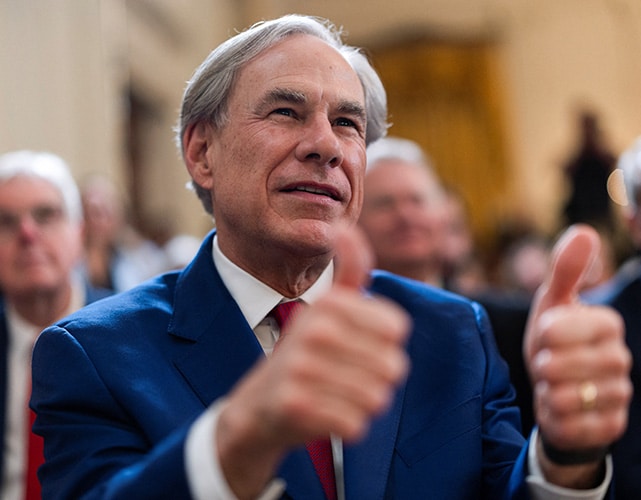Texas Governor Greg Abbott on Saturday signed a law making more than 5 million students eligible to use state funds for private schools, a watershed moment in the conservative campaign to remake public education in America.
Texas is allocating $1 billion for the first two years of the program to offer parents vouchers to pay for school. It is the 16th state to make all students eligible to receive public funds for private education.
“Today is the culmination of a movement that has swept across our state and across our country,” Abbott said during a signing ceremony at the governor’s mansion. “The day has arrived that empowers parents to choose the school that’s best for their child.”
The so-called universal school choice programs are all in states whose legislatures are dominated by Republicans, who for years have accused public schools of indoctrinating children with liberal ideology.
Advocates say school vouchers put control of children’s education into the hands of parents. Opponents say they drain money from public schools and predominantly benefit wealthier children.
More than 1 million U.S. students use state money or benefit from tax credits to pay for private school, according to EdChoice, an advocacy group supporting vouchers. The new Texas law means all 5.3 million children in the state’s elementary and high schools are eligible for vouchers, far more than in any other U.S. state.
Texas has the country’s second-largest public education system. About 50 million students are taught in public schools across the U.S., according to federal data.
President Donald Trump signed executive orders in January which directed the Department of Education to prioritize federal funding for school choice programs and instruct states on how to use federal grants to support private and religious schools.
Trump strongly supported the Texas bill and repeatedly urged legislators to pass it.
Most Texas students are now eligible for up to $10,000 a year to attend private schools beginning in the 2026-27 school year. The law requires private school students to take a nationally recognized standardized test, and annual audits of schools that accept vouchers. No more than 20% of the voucher program spending can go to families making 500% or more of the federal poverty limit, which amounts to a household income of about $160,000 for a family of four.
Supporters have pushed for school vouchers in Texas for more than 30 years. Until this year, Democratic opponents allied with rural Republicans who cited concerns that funding private schools would drain funds from public districts in small towns with few private schools.
Abbott organized pro-school choice Republicans to challenge anti-voucher Republicans in primaries in last year’s elections. His efforts helped unseat 15 incumbent Republican House members.
Effort Could Backfire, Some Warn
“No other governor has led on school choice like Governor Abbott,” said Jorge Borrego, the K-12 education policy director at the conservative Texas Public Policy Foundation.
Borrego noted that Abbott also pushed the legislature to hike public school funding. A separate bill passed by the Texas House and sitting before the Senate would hike funding for public schools by $7.7 billion over the next two years.
The new funding would certainly be welcomed, said Libby Cohen, executive director of Raise Your Hand Texas, an education advocacy group long opposed to vouchers.
“But what’s important to keep in context is for public schools to simply keep up with inflation since 2019, they would need just shy of $20 billion in new school funding,” she said.
Texas ranks 47th in the country in per-pupil spending, according to the National Education Association’s annual report released this week.
Texas schools receive funding based upon how many students they have, as is typical across the U.S. If public schools lose students to private educators because of vouchers, they will lose money, Cohen said.
Randi Weingarten, president of the American Federation of Teachers union, said the Trump administration is “threatening to slash funding to the neediest students” by withholding federal money for schools that engage in diversity, equity and inclusion efforts.
The Texas law will send “billions of dollars to private schools that can pick and choose who they educate,” she said.
Jon Valant, director of the Brookings Institution’s Brown Center on Education Policy, said the push for universal voucher systems in conservative states is more worrying than Trump’s effort to shut the Department of Education.
Voucher payments rarely cover the full cost of private schools, meaning only richer families can participate, he said.
“That could mean we end up with a terribly stratified school system where those who can afford to pay the difference are in a wealthy private system, while the public school system is left to crumble.”
In a joint statement from the conservative Heritage Foundation think tank, Lindsey Burke, director of its Center for Education Policy, and research fellow Jason Bedrick said the law “empowers families to choose the learning environments that align with their values and work best for their children.”
Other states that have implemented school voucher programs include:
Tennessee
Passed the Education Freedom Act of 2025, creating a universal Education Savings Account (ESA) program offering $7,000 per student.
Wyoming
Enacted the Steamboat Legacy Scholarship, a universal ESA program providing $7,000 per student.
Idaho
Launched its first private school choice program through a refundable tax credit, offering up to $5,000 per child for private educational expenses.
Alabama
Introduced a new tax-credit program providing families up to $7,000 per student for certain school-related expenses, initially limited to children of active-duty military personnel and those in poorly performing schools.
Louisiana
Rolled out the Louisiana Giving All True Opportunity to Rise (LA GATOR) program, centered around ESAs, with plans for universal eligibility after full implementation.
Florida
Expanded its school choice program by removing income-eligibility requirements, making all students eligible for taxpayer-backed vouchers as of the 2023-2024 school year.
Arizona
Offers a universal ESA program, allowing all K-12 students to receive public funds for private education expenses.
Iowa
Provides ESAs to all K-12 students, enabling them to use public funds for private schooling.
Utah
Implemented the Utah Fits All Scholarship Program, offering universal ESAs to students for private education expenses.
Indiana
Operates the Indiana Choice Scholarship Program, the largest school voucher program in the U.S., providing financial assistance to students for private school tuition.
North Carolina
Expanded its Opportunity Scholarship program to offer universal vouchers for private school tuition.
West Virginia
Established the Hope Scholarship Program, a universal ESA initiative for K-12 students.
Arkansas
Passed legislation creating a universal ESA program, allowing all students to access public funds for private education.
South Carolina
Enacted the Education Scholarship Trust Fund program, providing ESAs to eligible students for private schooling.
Oklahoma
Offers the Lindsey Nicole Henry Scholarship Program, providing vouchers to students with disabilities for private school tuition.
These programs vary in scope and eligibility, with some states offering universal access to all K-12 students, while others have more limited criteria.
This article was provided by Reuters. Rethinking65 contributed to this article.







